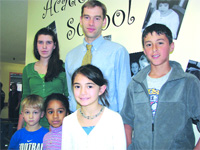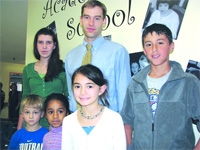
Learning Curves
Thinking Outside the Box — and the Textbook — at Academy Hill

Jake Giessman, or ‘Mr. G,’ as he’s known, with several of his students at Academy Hill. He described 2008 as a breakthrough year for the facility.
Jake Giessman says there are a number of quantitative measures to gauge the growing success and visibility of Academy Hill, the private school in Springfield that he directs.
For starters, theres the enrollment figure, which has climbed from roughly 60 to just over 100 since he arrived as a teacher in 2001. Theres also the spiraling number of applications to the school, located in a former nursing home off Liberty Street, as well as an expanding geographic radius of the students enrolled; it now stretches from Northern Conn. to Sturbridge and beyond.
While admittedly proud of such numbers and compass points, Giessman, or Mr. G, as most of the students call him, is admittedly more intrigued by some of the qualitative measures. These include the comments and actions of the private schools trying to recruit his graduates people like Matthew Woodard, who, when he was 11, wrote a concerto for a string quartet that was performed at Carnegie Hall, and many others.
There was one student last year he was the top choice at every school he applied to, Giessman recalled. People were calling me on my cell phone around financial-aid decision time they were asking, which school does he want to go to? Which way is he leaning?
Last year was amazing that way; it was the year we broke through with the prep schools, he continued. People know about us now; weve got kids that schools are fighting over.
Such attention provides ample evidence of how Academy Hill has emerged as an intriguing option for area parents of students who have higher academic potential, said Marjorie Weeks, director of Advancement for the school, who chose that phrase carefully.
Apparently, the words gifted and talented are not used, or used as much, to describe such students, she explained, noting that they often generate stigmas that can impact students, parents, teachers, and administrators at such facilities. So the school uses the slogan nurturing and challenging bright minds, and makes use of that phrase higher academic potential, she said, adding that it is the schools mission to help young people realize that potential.
It does so through its philosophy of engaging students and going well beyond textbooks and the Internet when it comes to imparting lessons in science, mathematics, social studies, Latin, and even economics.
Take as an example the recent field trip by middle school students to help them understand the causes and impact of the economic downturn. In addition to reading about the recession, the students visited those on the front lines of the meltdown from bond tradesmen to a bankruptcy attorney to gain firsthand knowledge. They even visited the local newspaper to see how the news is reported.
And soon, theyll be heading back downtown, to visit with people like Allan Blair, president of the Economic Development Council of Western Mass., and Tim Brennan, executive director of the Pioneer Valley Planning Commission, to see what they and others are doing to pull the region out of recession.
With the first visit, we wanted to help explain what this crisis was all about, said Giessman. This time, we want to explore whats happening to us and whats going on here in the Valley.
In this issue, BusinessWest goes inside the classrooms and hallways at Academy Hill to gain some perspective on the school, its progression, and plans for future growth.
Textbook Examples
Joshua Jacobson was talking about obesity, what prompts it, and why there is cause for alarm in this region and across the country.
But he didnt stop with a visual presentation that included a host of statistics about how overweight the country has become, lists of the physical problems from diabetes to sleep apnea that obesity can contribute to, and speculation about how the trend, if not reversed, could lead to skyrocketing health care costs across the nation.
Instead, the composed, articulate eighth grader from Westfield also engaged his audience of other middle school students in a discussion about what causes obesity, how those who are overweight feel from a self-image perspective, and what can be done to stem the tide.
The goal is to create a dialogue, said Giessman as he talked about Jacobsons contribution to a program called Forum.
A required part of the curriculum involving students of all ages, Forum (called the Good Morning Show for those in the early, or lower grades) requires students to make original presentations to their peers eighth graders do six a year, while kindergartners do three. In doing so, they gain experience with public speaking and also some self-confidence, said Giessman, while generating thoughtful discussion and maybe action concerning the subjects involved.
And that list includes everything from the origins of the universe to the development of the elevator to my new kitten, he told BusinessWest, adding that Forum is just one of the many ways in which Academy Hill goes about that task of helping students realize potential.
Overall, the school takes a team approach to that assignment, he continued, adding that this includes teachers, administrators, parents, and, as the Forum program clearly demonstrates, the students themselves.
Cultivating and nurturing this team approach has been Giessmans unofficial job description since he became head of school in 2006 and ushered in an ongoing period of growth and development.
Tracing the history of the school, Giessman said it began in the 70s as a parent-run cooperative that included weekend and afterschool enrichment. It became a day school in the mid-80s, during the hey-day of the gifted and talented school, he continued, and operated in space leased first from Wilbraham-Monson Academy and then MacDuffie School. In 2000, the school moved to its present site, one that afforded considerable space for the expansion thats been realized.
Current tuition is $10,000 per year, and this accounts for most of the schools annual budget, said Weeks, noting that there is an annual giving campaign and other fund-raising efforts. These include a recent auction that included a reserved parking space near the front entrance that is now the property of Olivias Mom, who paid $500 for it.
Prospective students applications are weighed on a number of factors, said Giessman, listing a short IQ test (scores are not disclosed, but most all students are in the high-average to well-above-average range); references, especially from teachers recommending the school to parents; and student interviews. Theres no single factor that trumps everything else, he noted. In the end, they need to be able to come here, want to come here, and be able to get down to the business of learning.
Students can start at the kindergarten level, but many begin a few years later, because it is generally between second and fourth grade that parents and teachers will recognize strong academic ability and conclude that a child may not be getting everything that he or she needs in a traditional school, he explained.
Students come from a wide area, he told BusinessWest, listing such remote communities as Brimfield, Sturbridge, Mongtomery, and Washington. Meanwhile, the schools location near both Baystate Medical Center and Mercy Medical Center has made it a popular alternative for professionals working at both facilities.
They are drawn not simply by geography, however, but by what Giessman described as a more creative curriculum and more social environment than what might be found at public schools or other private facilities. Learning here is cool.
Lesson Plans
In his tenure, Giessman, who was a member of BusinessWests inaugural class of 40 Under Forty in 2007, has led efforts to add and grow a middle school (grades 5 through 8), increase enrollment, improve visibility, launch the schools annual fund, a campaign for unrestricted gifts, and initiate other fund-raising efforts.
These days, he devotes time to a number of duties, from teaching classical literature, including some Shakespeare comedies like A Midsummer Nights Dream and Much Ado about Nothing were on the recent reading list to crafting a long-term strategic plan for the school.
That document calls for, among other things, achieving continued growth in enrollment, nurturing the seeds recently planted for an endowment, and generating continued expansion and refinement of an educational approach he described this way: picture in your head what typical teaching is and that has nothing to do with what goes on here.
Teaching as an art form is, by and large, a way of forcing or tricking kids into learning, he continued. Here, its different; its more akin to coaching or being part of the team with the students. In the conventional setting, its as if the students are holding the teacher back; here, the teacher has to scramble not to hold the student back.
As Weeks led a tour of the school, she explained this phenomenon, and also how Academy Hill has grown, evolved, and created its current look and feel.
Describing that feel, she said its a more-casual learning environment, one that involves very small classes and an individualized approach. Theres a lot of freedom, said Weeks, but also a lot of structure, because young minds need both. Elaborating, she borrowed a well-worn line from the theme song to Cheers: everybody knows your name.
And by everybody, she meant parents, who play an active part in many of the programs at the school. They can often be seen sitting in the back rows during the Forum and Good Morning Show presentations, Weeks explained those sessions can be really entertaining; its worth spending your morning coffee watching them and they take part in many of the classroom activities as well.
Parents are part of the equation here, she continued, adding that teachers and administrators want them to participate. We encourage them to work through their passion points; we try to hone their energies into what theyre good at.
And while there is a sense of competition in this school for those with higher academic potential, said Giessman, there is also what he called a culture of support that dominates this learning environment and is embraced by students and parents alike.
Students here are driven, but theres a sense of support and encouragement among the kids, he explained. I dont know if thats because of who they are or because of the way were structuring measures of their achievement, but its there.
When asked where his students go from Academy Hill, Giessman smiled and said, wherever they want.
Some return to public school systems several are now enrolled at Longmeadow High School but many attend private secondary schools, and they are, as Giessman said, recruited heavily. The prep schools of Connecticut and Western Mass. are actively recruiting our students, he explained. And some from the Boston area are also sending representatives out to grab some of our graduating eighth graders; its great to see such strong interest.
Chapter and Verse
When asked about some of the many R-rated aspects of Shakespeares writing and how he handles them given the age of his students, Giessman, who reads those works to his charges and pauses often for questions and discussion, said, well there are some things you gloss over.
But there isnt much glossing over of anything else at Academy Hill, where students not only absorb the Bard, they act out some of his plays; A Midsummer Nights Dream and Julius Caesar were among the recent performances, and one student actually wrote an adaptation of Twelfth Night.
Such talent has caught the attention of the prep schools, thus putting Academy Hill on the map, and giving Giessman a rather intriguing measure of the success he and his staff has achieved.
George OBrien can be reached at[email protected]





